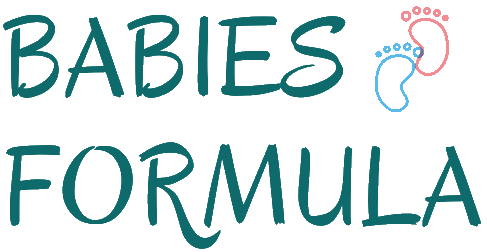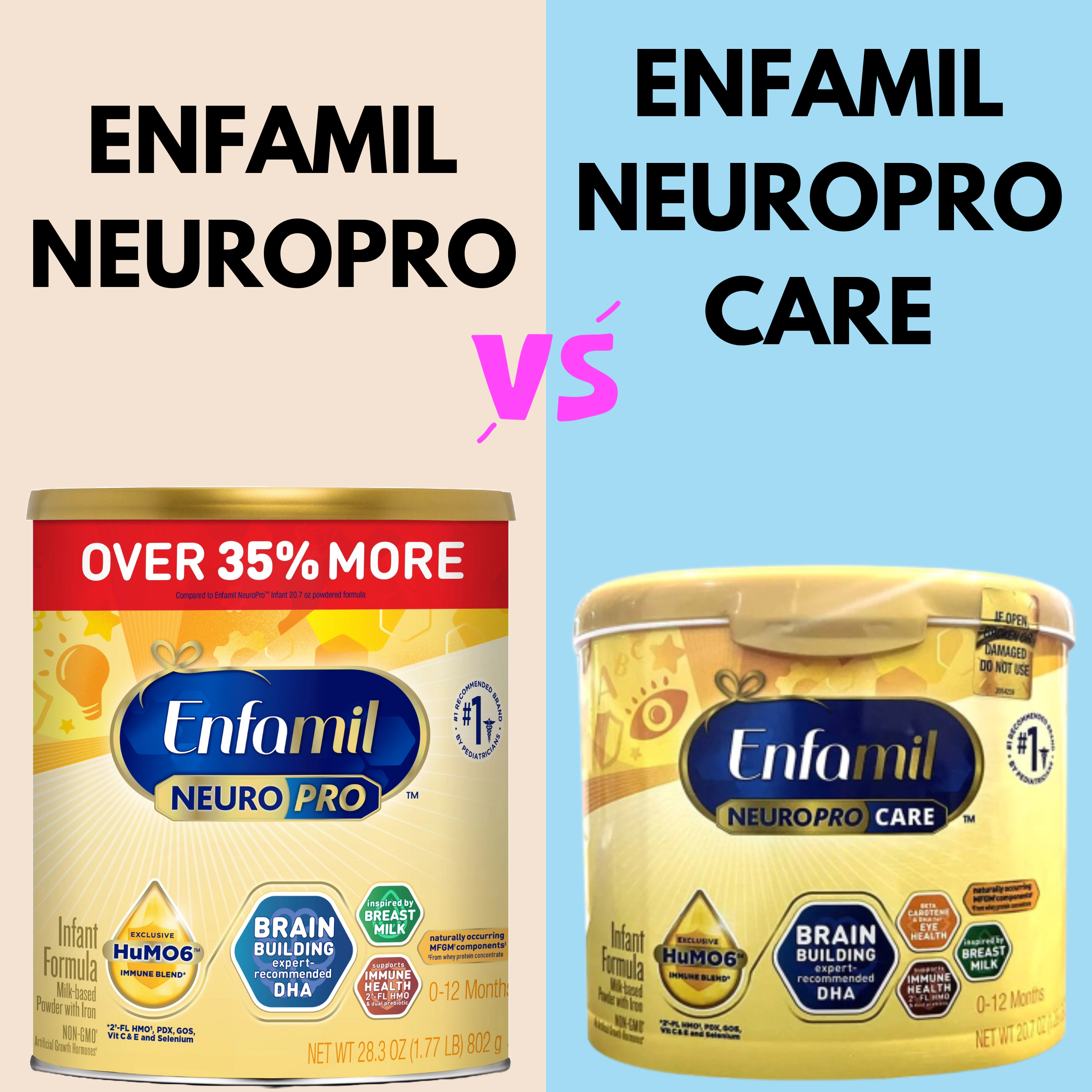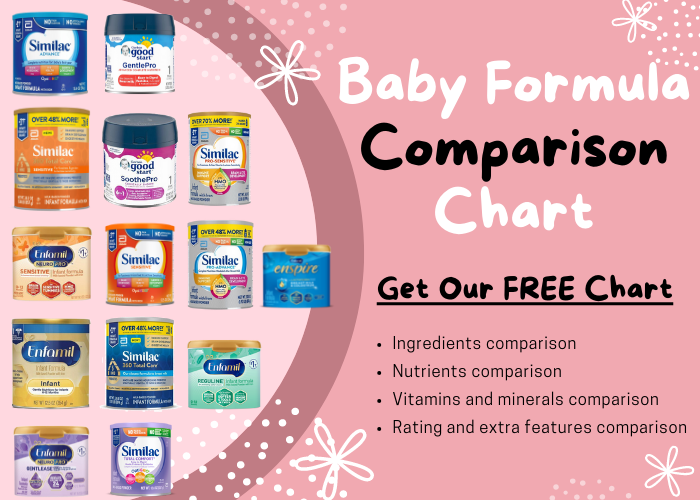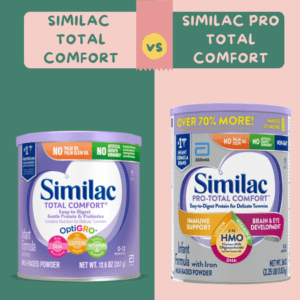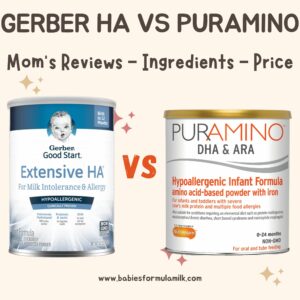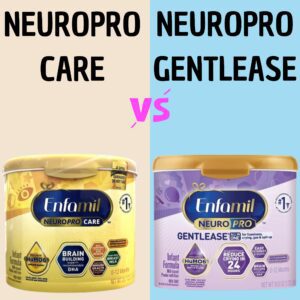Key Differences Between Enfamil Neuropro Vs. Neuropro Care?
Enfamil NeuroPro and NeuroPro Care are standard milk-based formulas that feature triple prebiotics and non-GMO ingredients. However, NeuroPro Care stands out for being more budget-friendly and offering a higher vitamin D content compared to Enfamil NeuroPro.

“When you buy something using my links, I may earn a small commission at no additional cost to you. This is a kind of support to me. This website doesn’t accept money for reviews. “
The Best One?
Enfamil NeuroPro:
- Widely available: If convenience and accessibility are important to you, the fact that NeuroPro is widely available can be a significant advantage. You can find it easily in many stores.
- Ready-to-feed option: If you prefer the convenience of ready-to-feed formula, then NeuroPro is a suitable choice. It can be particularly helpful for busy parents or when you’re on the go.
Enfamil NeuroPro Care:
- Cost-effective: NeuroPro Care is more budget-friendly, which can be a significant factor for many families. If cost is a concern, this option might be more appealing.
- Higher vitamin D content: NeuroPro Care has a slightly higher vitamin D content. Adequate vitamin D is essential for babies’ bone health and overall development, so this can be a positive aspect.
Both formulas are non-GMO and contain triple prebiotics, which are beneficial for gut health.
Ultimately, the “best” choice depends on your family’s specific needs and priorities. If cost is a significant factor for you, and you’re comfortable with the slightly higher vitamin D content in NeuroPro Care, it could be a suitable option. On the other hand, if convenience and the availability of ready-to-feed formula are more important, you may prefer NeuroPro.
Mom’s Reviews Comparison:

Enfamil Neuropro Care:
Positive Reviews:
- Affordable: Enfamil NeuroPro Care is considered affordable by many users. This positive aspect is particularly important for parents looking for a cost-effective infant formula option that doesn’t compromise on quality.
- Easy to Prepare: Ease of preparation is a significant factor for parents, and the formula is praised for being easy to mix and prepare, simplifying the feeding process.
- Easy on Digestion: This point highlights that Enfamil NeuroPro Care is gentle on babies’ digestive systems, which is crucial for minimizing discomfort and digestive issues in infants.
Negative Reviews:
- Price Increase: Some users express dissatisfaction with price increases over time, indicating that they have noticed the formula becoming more expensive, which can be a concern for budget-conscious parents.
- Transition Issues: There are mentions of transition issues, suggesting that some babies may have difficulty switching to Enfamil NeuroPro Care from other formulas or breastfeeding. This can be a concern for parents looking for a smooth transition.
- Limited In-Store Availability: The formula’s limited in-store availability could be inconvenient for some users who prefer to purchase it directly from physical stores. Limited availability can lead to frustration when trying to find the product in local retail outlets.
Related: Enfamil Neuropro Gentlease Vs Neuropro Care: What’s The Difference?
Enfamil Neuropro:
Positive Reviews:
- Easy to mix and prepare: Many reviewers appreciate that this formula is easy to mix with water, making it convenient for parents and caregivers. This ease of preparation is particularly important when caring for an infant.
- Well-tolerated by babies’ digestive systems: Several reviewers mention that their babies tolerated this formula well, without experiencing digestive issues such as gas or discomfort. This is a crucial factor in choosing the right formula.
- Baby likes the taste: Some reviews highlight that their babies enjoyed the taste of this formula. Ensuring that the formula is palatable to the infant can make feeding smoother and more enjoyable for both the baby and the caregiver.
- Good value for the price: Despite being on the higher end in terms of price, many parents believe that Enfamil NeuroPro offers good value for the quality and benefits it provides for their infants.
- Long shelf life (good expiration dates): The formula’s long shelf life is noted positively, giving parents peace of mind that they can purchase and store it in advance without worrying about it expiring quickly.
Negative Reviews:
- Price (considered expensive): Enfamil NeuroPro is often criticized for its higher price compared to other infant formulas. Some parents find it expensive and wish for more cost-effective options.
- Transition issues (from breastmilk or other formulas): A few parents describe challenges when transitioning their babies to Enfamil NeuroPro, especially if their infants were previously breastfed or using different formula brands.
Related: Enfamil Neuropro Vs. Enfamil Infant: Full Comparison
Ingredients Comparison:
Age Range:
Enfamil NeuroPro and Neuropro Care are formulated for infants aged 0-12 months. They provide essential nutrients designed to support the nutritional needs of newborns and growing infants.
Protein Source:
Enfamil NeuroPro: The protein source in this formula is a combination of 50% nonfat milk and 50% whey protein concentrate. It maintains a specific whey-to-casein ratio of 65:35, which is designed to be more akin to breast milk’s composition.
Enfamil NeuroPro Care: Like its counterpart, this formula also uses nonfat milk and whey protein concentrate as protein sources. However, it does not provide the exact whey-to-casein ratio.
Related: Enfamil Neuropro Vs Enfamil Gentlease: Full Comparison
Carbohydrate Source:
Both Enfamil NeuroPro and NeuroPro Care exclusively use 100% lactose as the carbohydrate source. Lactose is a natural sugar found in milk and is easily digestible for most infants.
Fat Source:
Both formulas incorporate a blend of fats that includes palm oil, soy oil, high oleic sunflower oil, and coconut oil as sources of essential fatty acids. These fats are crucial for brain development.
Key Nutrients:
Both Enfamil NeuroPro and NeuroPro Care are fortified with important nutrients, including DHA (docosahexaenoic acid) and ARA (arachidonic acid). These omega-3 and omega-6 fatty acids play a critical role in supporting infant brain and eye development.
Additionally, both formulas contain MFGM (milk fat globule membrane), which is associated with cognitive development. MFGM is found in the fat component of breast milk and is included in these formulas to provide potential benefits for infant brain health.
Related: Enfamil NeuroPro Vs. Enfamil Enspire OPTIMUM
Prebiotics:
Both Enfamil NeuroPro and NeuroPro Care feature prebiotics to support the development of a healthy gut microbiome. These prebiotics include 2′-FL HMO (2′-fucosyllactose), polydextrose, and galactooligosaccharides, which promote the growth of beneficial gut bacteria.
GMO-Free:
Both formulas proudly declare themselves as non-GMO (genetically modified organism) products. This means they are free from genetically modified ingredients, providing parents with peace of mind regarding the sourcing of their baby’s nutrition.
Generic Brands:
Both Enfamil NeuroPro and NeuroPro Care offer parents the flexibility to choose from nine different generic brands. This choice allows parents to explore alternatives while still ensuring their baby receives the essential nutrients they need. Read Best 9 Generic Brands of Enfamil NeuroPro.
Source of ARA (Arachidonic Acid) and DHA (Docosahexaenoic Acid):
Both formulas rely on specific sources for ARA and DHA, which are vital for infant development. They use Mortierella alpina oil as the source of ARA and Schizochytrium sp. oil as the source of DHA.
Nutrients Comparison:

Protein, Fat, and Carbohydrate:
- Both formulas provide 2.1 grams of protein per 100 calories (5 fl oz) serving.
- Both formulas contain 5.3 grams of fat per 100 calories (5 fl oz) serving. Adequate fat intake is essential for brain development and overall growth in infants.
- The carbohydrate content in both Enfamil NeuroPro and NeuroPro Care is 11.3 grams per 100 calories (5 fl oz) serving. The primary carbohydrate source in both formulas is lactose.
Vitamins:
- Both formulas provide equal vitamin levels except for Vitamin D: Enfamil NeuroPro offers 70 IU of Vitamin D per 100 calories (5 fl oz) serving, while NeuroPro Care provides a higher amount at 75 IU. Vitamin D supports bone health and overall development.
Choline and Inositol:
- Both Enfamil NeuroPro and NeuroPro Care offer 24 mg of choline and 24 mg of inositol per 100 calories (5 fl oz) serving. These nutrients play essential roles in brain and nerve function. the average level of inositol in breast milk during lactation is 22mg /100 Cal.
Related: Similac Advance Vs Enfamil Neuropro
Minerals:

Enfamil NeuroPro and NeuroPro Care have identical mineral profiles, with consistent levels of essential minerals such as calcium, phosphorus, iron, zinc, and others. These minerals are essential for the healthy growth and development of infants and are provided in balanced amounts in both formulas. Parents can feel confident that both Enfamil NeuroPro and NeuroPro Care offer the necessary mineral support for their baby’s nutritional needs.
Price Comparison:
| Enfamil Neuropro | Enfamil Neuropro Care |
|---|---|
| 20.7 oz 34.87 $ 1.69 /oz 28.3 oz 46.87 $ 1.66 /oz 31.4 oz 51.00 $ 1.62 /oz 32 fl oz 11.82 $ 36.9 ¢/fl oz | 20.7 oz 27.99 $ 1.35 /oz |
| 4.8 of 5.0 10740 reviews | 4.8 of 5.0 5355 reviews |
| Buy 20.7 oz HERE Buy 28.3 oz HERE Buy 31.4 oz HERE Buy 32 fl oz HERE | Buy 27.99 oz HERE |
- Enfamil NeuroPro:
- 20.7 oz: $34.87 (Price per ounce: $1.69/oz)
- 28.3 oz: $46.87 (Price per ounce: $1.66/oz)
- 31.4 oz: $51.00 (Price per ounce: $1.62/oz)
- 32 fl oz: $11.82 (Price per ounce: 36.9 ¢/fl oz)
- Rating: 4.8 out of 5.0 based on 10,740 reviews
- Ready-to-feed: Yes
- Enfamil NeuroPro Care:
- 20.7 oz: $27.99 (Price per ounce: $1.35/oz)
- Rating: 4.8 out of 5.0 based on 5,355 reviews
- Ready-to-feed: No
When comparing the prices of Enfamil NeuroPro and Enfamil NeuroPro Care for the available sizes, Enfamil NeuroPro Care appears to have a lower price per ounce compared to Enfamil NeuroPro.
However, Enfamil NeuroPro offers larger size options (28.3 oz and 31.4 oz) for those looking to purchase in bulk, with prices per ounce of $1.66/oz and $1.62/oz, respectively. Additionally, Enfamil NeuroPro also offers a ready-to-feed option in a 32 fl oz size for $11.82 (36.9 ¢/fl oz).
Both Enfamil NeuroPro and Enfamil NeuroPro Care have high customer ratings (4.8 out of 5.0), indicating customer satisfaction with their quality. The choice between the two formulas may depend on your preference for price, size, and the ready-to-feed option.
One thing to note is that the price of Enfamil Neuropro has increased fast during this year. For example, the 20.7 oz size was only 29.98$ and the ready-to-feed (32 fl oz) was 9.64$. Sincerely it’s very sad to see this rocket increase in price.
How to Switch Between Enfamil Neuropro and Neuropro Care?
- Choose the New Formula: If you’ve decided to switch from Enfamil NeuroPro to NeuroPro Care (or vice versa), ensure that you have the new formula on hand before starting the transition.
- Gradual Transition: It’s generally recommended to transition gradually over several days to a week. Sudden changes in the formula can lead to digestive upset. Here’s a sample transition plan:
- Days 1-2: Mix 25% of the new formula (NeuroPro Care) with 75% of the current formula (Enfamil NeuroPro).Days 3-4: Increase the ratio to 50% new formula and 50% current formula.Days 5-6: Use 75% new formula and 25% current formula.Day 7 and beyond: Gradually transition to 100% of the new formula (NeuroPro Care).
- Observe Your Baby: Pay close attention to how your baby responds to the new formula. Look for signs of digestive discomfort, changes in stool consistency, or any adverse reactions. If you notice any concerns, consult your pediatrician.
- Stay Hydrated: Ensure that your baby stays well-hydrated during the transition. Continue to offer breast milk or formula as needed to prevent dehydration.
- Monitor for Allergies or Sensitivities: If your baby has a history of allergies or sensitivities, be vigilant for any allergic reactions or sensitivities to the new formula. Symptoms may include rash, hives, excessive fussiness, or digestive issues.
- Stick with One Formula: While transitioning, avoid switching back and forth between formulas. This can confuse your baby’s digestive system. Once you’ve completed the transition successfully, continue with the chosen formula unless advised otherwise by your pediatrician.
- Keep Track: Document the transition process and any observations or changes in your baby’s feeding habits. This information can be helpful when discussing your baby’s progress with your pediatrician.
Remember that every baby is unique, and their response to formula changes may vary. It’s essential to consult with your pediatrician and closely monitor your baby throughout the transition process to ensure their well-being and comfort.
